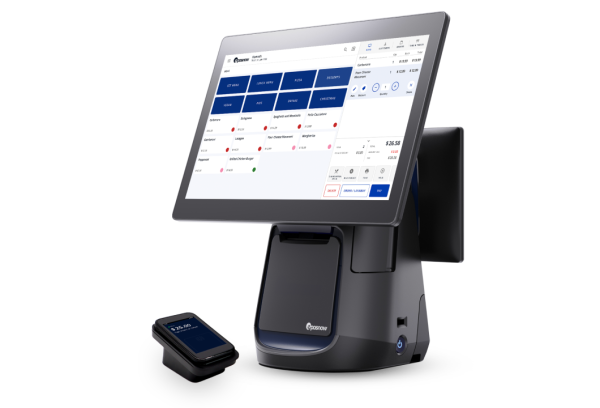Bar Employees: Tips for Hiring, Training & Managing Staff Members
Hey there, bar managers! If you're reading this, then you know how important it is to have a solid team of bar employees to keep your establishment running smoothly. After all, your staff is the face of your bar and can make or break the customer experience.
But let's face it, hiring, training, and managing bar employees can be a challenge. It's a demanding job that requires patience, attention to detail, and the ability to boost employee morale.
In this blog post, we'll cover tips and strategies for hiring, training, and managing bar employees that will help you create a happy and healthy work environment and keep your bar business running like a well-oiled machine. Whether you're a seasoned bar manager or new to the bar and restaurant industry, read on to learn how to build and retain a top-notch team of bar employees.
So, grab a drink and get ready to take some notes. Whether you're looking to improve your hiring process, enhance your training program, or refine your management style, we've got you covered. Let's dive in!
Hiring bar staff
Hiring the right people for your bar can make all the difference in creating a welcoming and memorable experience for your customers. In this section, we'll explore tips and strategies for finding and hiring the best bar staff.
Characteristics to look for in a bar employee
As a bar manager in the hospitality industry, you want to hire quality employees who will represent your bar in the best way possible. When it comes to hiring bar employees, it's important to look beyond just their work experience and education. Here are some key characteristics to keep in mind:
- Outgoing and friendly personality: A personable and welcoming demeanor is essential for creating a positive experience for your customers. Look for candidates who are friendly and approachable, and who can make customers feel at ease.
- Excellent communication skills: Bar staff must be able to communicate effectively with customers, coworkers, and the bar manager or bar managers. Look for candidates who are articulate, clear, and confident in their communication.
- Ability to multitask: In a fast-paced environment like a bar, employees need to be able to juggle multiple tasks at once. Look for candidates who can handle a high volume of customers and orders without getting overwhelmed.
- Knowledge of alcoholic beverages: Your bar staff should have a good understanding of different types of beer, wine, and spirits. This will help them make recommendations to customers and provide an overall better experience.
During the interview process, keep these characteristics in mind and ask questions that will help you determine if the candidate possesses them. For example, you might ask them to describe a time when they went above and beyond for a customer, or how they handle working under pressure.
Job description and qualifications
Always make sure you include the following element in your job descriptions:
- Key job information (job title, your bar name and location, hours working each week, and pay)
- A summary of the duties of the role
- Any required qualifications (or ‘desired qualifications’ if you’re open to people without qualifications)
- Any necessary experience (or ‘desired experience’, if you’re open to candidates without previous bar experience)
- Any necessary skills (these can be soft skills like customer service, attention to detail or teamwork)
- How to apply for the role (contact through phone, email, or through your website)
When crafting a job description for a bar staff, it's important to not only outline the specific duties and expectations of the role, but also to include any necessary qualifications or experience. It is up to you to decide if the qualifications or experience is essential (a candidate must have them), or desired (ideal candidates will have them, but you’re open to candidates who don’t have the listed qualifications or experiences). For instance:
- Qualifications you could look for could be a high-school diploma, or a qualification in health and safety with food.
- Technical experience could be if a candidate has used Bar POS (Point of Sale) systems and KDS (Kitchen Display Systems).
- Relevant experience could be a minimum number of years someone has worked at a bar before, or if someone has been to cocktail mixology classes.
For example, your job listing for a server might include a description of duties such as taking orders, delivering food and drinks, keeping the bar stocked, and maintaining a clean and organized workspace. However, it's also important to include experience such as working with a Epos Now's point of sale and the ability to navigate a KDS.
In addition to these technical experiences, you may also want to consider other skills and experience that could be valuable in a bar employee. For example, experience with customer service or conflict resolution could be beneficial for a server or bartender, while knowledge of mixology or wine could be important for a bartender or sommelier.
Interview questions
Interviewing candidates for a bar employee position can be an exciting but nerve-wracking experience. To ensure that you find the right fit for your establishment, it's important to ask the right questions during the interview process. Here are some example questions that you can ask:
- Can you tell me about a time when you provided exceptional customer service in the bar or restaurant industry?
- How do you handle difficult customers or complaints?
- Have you ever had to diffuse a tense situation with a co-worker or manager? How did you handle it?
- Can you give an example of a time when you had to multitask and prioritize tasks in a busy environment?
- How do you stay organized and maintain a clean workspace in a busy bar environment?
These questions can help you gauge the candidate's experience, communication skills, and ability to handle stressful situations. Additionally, asking behavioral-based questions (such as "Can you tell me about a time when...") can give you insight into how the candidate has handled similar situations in the past and how they may handle them in the future.
Remember to also assess the candidate's personality and cultural fit for your establishment. For example, if your bar has a relaxed and friendly atmosphere, you may want to look for candidates who have a warm and welcoming demeanor.
Where to find potential candidates
Finding the right candidates for your bar can be challenging, but there are several ways to reach potential candidates. You can post job listings on online job boards, such as Indeed or LinkedIn, or reach out to local hospitality schools and programs.
Another way to find potential candidates is by networking within the industry. Attend industry events, such as bartending competitions or mixology conferences, and meet other professionals in the field. You may also want to consider offering employee referral bonuses to encourage your current staff to recommend qualified candidates.
By focusing on these key areas when hiring bar staff, you'll be well on your way to building a top-notch team that will provide excellent service to your customers.
Training bar employees
Let's face it, even the most talented and skilled employees need proper training to succeed. As a bar manager, it's your job to provide your staff with the tools and resources they need to excel in their roles. Here are some fun and practical tips for training your bar employees:
1. Shake up your training program
Creating a comprehensive training program is a great way to ensure that all employees are on the same page and understand your expectations. But that doesn't mean it has to be dull!
Try spicing things up with fun and engaging activities like role-playing, scavenger hunts, or even trivia contests. Your employees will appreciate the break from the norm and will retain the information better.
2. Get hands-on
Don't just talk about how to make a perfect martini - show your employees!
Hands-on training experiences like mixology workshops or beer and wine tastings are not only fun, but they're also a great way to improve product knowledge and build team camaraderie.
3. Keep the learning going
Training shouldn't stop after the initial onboarding process. Make sure to provide ongoing training opportunities to keep your employees up-to-date with the latest trends and techniques in the bar and restaurant industry.
This can include attending industry conferences, hosting guest speakers, or even just regular staff meetings to discuss new menu items or service techniques.
4. Encourage creativity
Your employees are a valuable source of creativity and ideas. Encourage them to get creative with their drinks and menu suggestions. This can lead to new and exciting ideas for your establishment and boost employee morale.
5. Emphasize teamwork
In the bar and restaurant industry, teamwork is essential.
Make sure to emphasize the importance of communication and collaboration among your employees to ensure a smooth and efficient operation. Team-building exercises or mock service scenarios can be a fun way to reinforce this message and practice skills.
Here are some examples of training activities that you can incorporate into your program:
- Role-playing exercises to practice handling difficult customers or situations.
- Wine and beer tasting sessions to improve product knowledge.
- Bartending workshops to teach new techniques and skills.
- Food pairing exercises to improve menu knowledge.
- Mock service scenarios to practice speed and accuracy.
By following these tips and incorporating fun and engaging training activities, you can help your employees succeed and create a positive and productive work environment.

Epos Now’s Bar POS: For Real-Time Traders
Delight staff and customers alike with one-tap ordering, omnichannel sales and real-time reporting so you can respond instantly on those busy Saturday nights.
Managing bar employees
Managing bar employees can be a lot like juggling flaming bottles - it's a bit of a balancing act. But fear not! We've got some tips to help you manage your bar staff and boost morale in a fun and effective way:
1. Communication is key
Don't be like that bartender who mumbles behind the bar and can't be bothered to make eye contact with customers.
- Keep the lines of communication open with your servers, hostesses, prep cooks, wait staff and bartenders.
- Encourage staff to provide feedback and be receptive to their suggestions.
- Make sure your invite all staff to regular sessions where you discuss if you’re on target with your sales and goals, way to improve, and any business changes or opportunities. It’s important not to leave people out.
This will help build a sense of trust and respect between you and your employees, and you'll all be on the same page when it comes to running the bar like a well-oiled machine.
2. Lead by example
You're the boss. So you gotta lead by example! Show your employees the behavior and work ethic you expect from them. If you're constantly late, slacking off, or drinking on the job, your employees will follow suit. But if you're punctual, hardworking, and professional, your employees will take notice and follow your lead.
3. Recognize and reward good work
When employees go above and beyond, make sure to recognize their efforts and reward them accordingly. This could be something as simple as a verbal pat on the back or a high-five, or you could take it up a notch and offer a small bonus or gift card.
When employees feel appreciated and valued, they're more likely to stay motivated and put in the effort to make your bar successful.
Examples of employee recognition and rewards:
- Employee of the month awards with a silly trophy or certificate
- Gift cards to local restaurants or bars for a fun night out
- Extra paid time off or vacation days to enjoy some well-deserved R&R
- Cash bonuses for hitting sales goals or providing exceptional service, and make sure to make a big deal of it by playing some celebratory music or ringing a bell!
- Public recognition in staff meetings or on social media, because everyone loves a little bit of fame!
4. Set clear expectations
You can't expect your employees to read your mind, amigos! Make sure your expectations are crystal clear and that your employees understand the consequences of not meeting them. This will help keep everyone on the same page and prevent misunderstandings that can lead to a lot of unnecessary drama.
5. Foster a positive work environment
No one likes a Debbie Downer! Encourage a positive work environment by promoting teamwork and celebrating successes. Plan team-building activities or cocktails after work to boost morale and create a sense of camaraderie among your employees. When everyone is having fun and getting along, it makes the workday go by a lot smoother.
Remember, managing bar employees isn't just about enforcing rules and regulations, it's about having fun, building relationships, and creating a team of dedicated and motivated employees. So put on your party hat, amigos, and get ready to manage your bar staff like a boss!
Cheers to your bar business
Hey, you made it to the end! Congrats! As you can see, managing a successful bar business requires a lot of effort and attention to detail. From writing job descriptions to hiring quality employees and providing ongoing training and managing day-to-day bar operations, it's a lot to handle. But with the right tools and strategies, you can create a thriving establishment that keeps customers coming back for more.
One of the most important aspects of building a strong team is writing clear and accurate job descriptions. By outlining the responsibilities and qualifications needed for each position, you can attract the right candidates and set your employees up for success. And remember, the bar industry is constantly evolving, so make sure to keep your training programs up-to-date to stay ahead of the competition.
Overall, the bar industry can be challenging, but it's also incredibly rewarding. With hard work, dedication, and a commitment to quality, you can build a successful bar business that stands the test of time. Good luck, and cheers to your success!
Need some more helpful tips on running a successful bar? Check out our additional resources below:
Ready to take your bar's efficiency to the next level? Contact us today to learn about the best POS solutions for your business, and streamline your operations for maximum profitability!



